All of the signs were there: the gentlemen that designed the all-time classic Troyes had a new, sci-fi themed game with lots of dice and multi-use cards. A cool board mechanic that simulates a spaceship moving through space. Artwork by Ian O’Toole, aka the busiest man in tabletop illustration. An incredible-looking production, with personal player boards, lots of tiles, a main action board, lots of variability and cute little robot pieces. All in a playtime that runs at about 90 minutes for a game with 3 experienced players.
Black Angel, published by Pearl Games and designed by the same guys who gave us Troyes and Tournay (Sébastien Dujardin, Xavier Georges, and Alain Orban), was first displayed at Gen Con 2019. The table presence alone kept the game’s booth crowded for the entire show. One look and I was sure it would be a classic, even if I didn’t quite understand the game’s mechanisms when I first saw it.
The price tag: $84.99 USD. Out of my price range for a game I’ve never played, so I waited for someone else in my assorted gaming groups to buy it. Then the reviews started to surface.
“Meh, it’s just not Troyes!”
“It’s a dense experience, and I prefer Troyes anyway.”
“Love the look, but I was hoping for this to be better than Troyes. It just isn’t!”
The Troyes shadow loomed large, and Black Angel had an impossible task: how do we make people see that this is a different game? Multiple friends sold their copies on the secondary market before even ripping off the shrink. Some held onto their copies but never convinced themselves that they should spend the time investing in a new experience if they loved Troyes anyway.
Slowly, Black Angel faded from view, at least for me. Last summer, one of my gaming groups put Black Angel on the table and I really liked it. I ran out and bought a used copy for $40 through a secondary market on Facebook. Then? I let Black Angel sit on my shelf for 6 months without playing it again.
Recently, though, Black Angel has resurfaced on other game nights and I’ve gotten more plays in. I’m ready to say that “the people” missed on Black Angel, because the game never got the chance to distinguish itself from its older cousin.
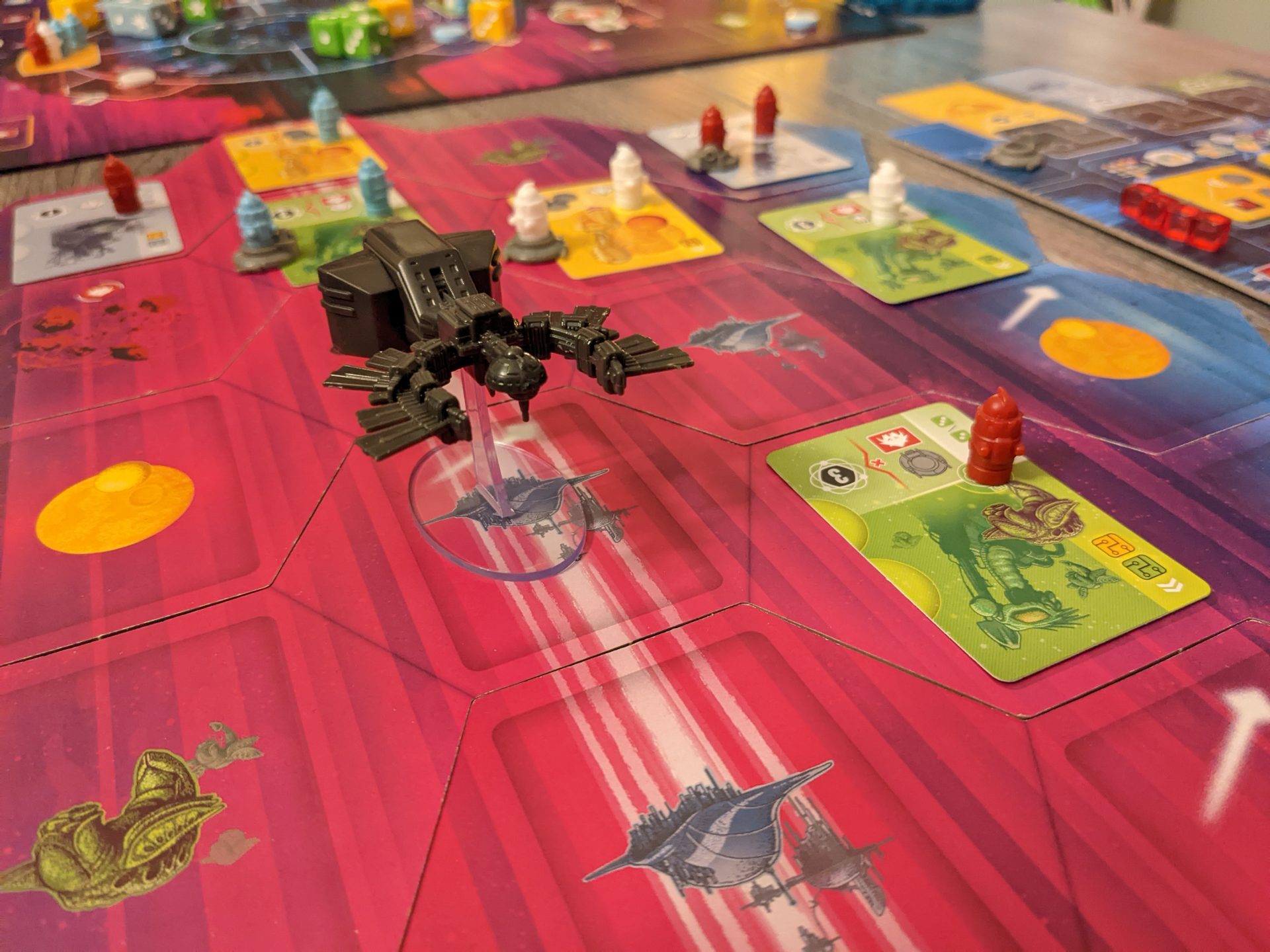
Blah Blah Backstory Blah
I won’t even pretend that the backstory for Black Angel makes any sense, because I can’t make it make sense to myself.
So, let’s take a different approach. Humanity has done it again, destroying Earth to the point that a mission is launched to potentially save us all. Enter the Black Angel, a ship speeding towards the planet Spes, where a chance at establishing new life awaits.
You’re in charge of a bunch of robots, a tech tree, and a few scout ships. You need to score the most points by the time the Black Angel touches down.
There are a few things getting in everyone’s way. First, there are the Ravagers, alien ships bent on destroying the ship. Throughout the game, you’re going to have to work with other players to keep the ship from taking too much damage. If you don’t, taking certain actions becomes impossible, and if too many Ravagers show up (in the form of cards, which penalize actions), that could end the game before the Black Angel completes the trip to Spes.
Then, there are limited dice, and these dice are what all players use to take actions around the two boards of the game: the interior of the Black Angel, and a board representing space. Just like Troyes, Black Angel features 3 main colors of dice that can be used to take actions, and fighting over these dice creates a good amount of tension.
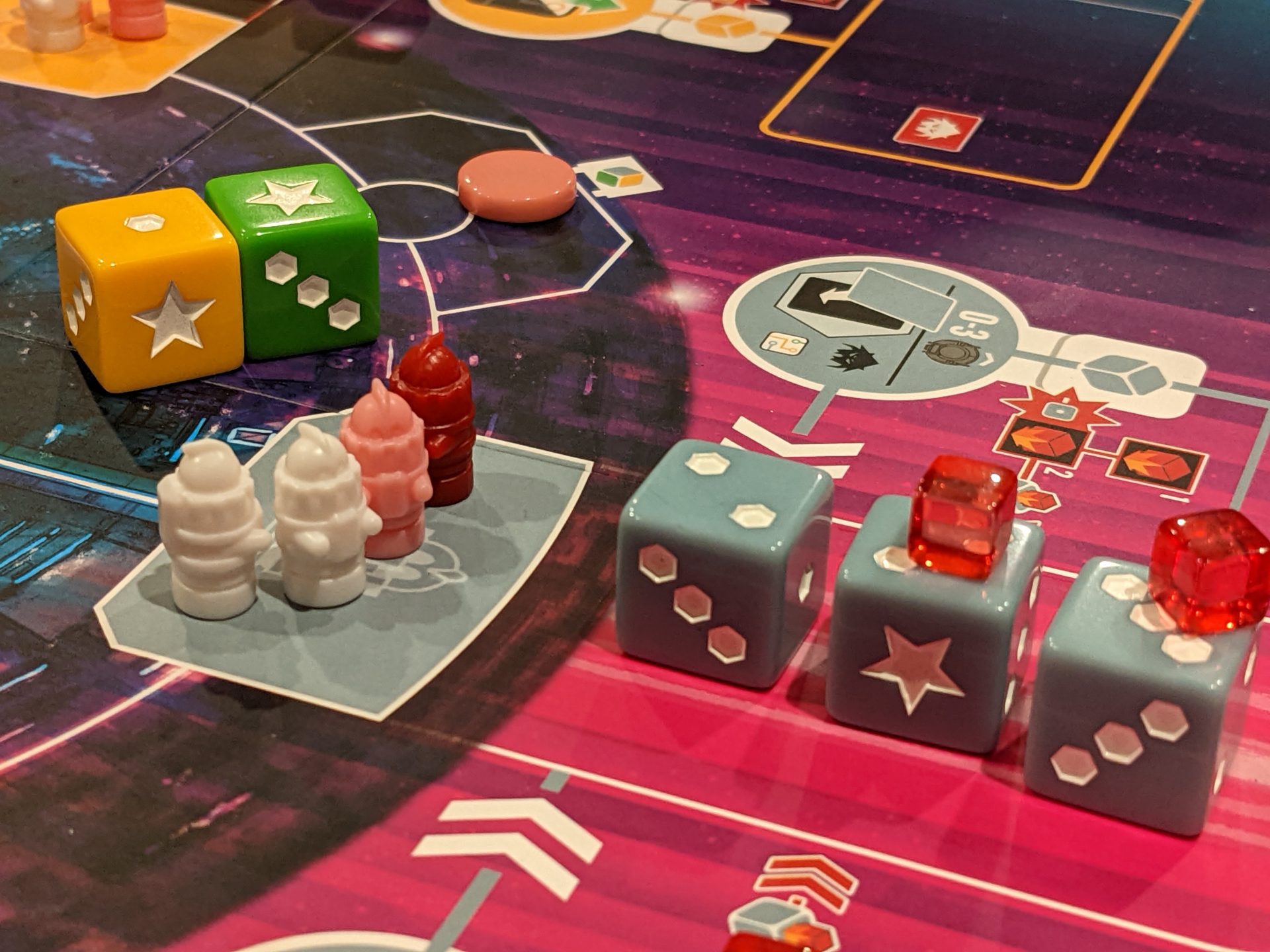
Also, just like Troyes, the number of pips on a die dictate what actions are really available to you. In Black Angel, the game is played in rounds, where players take actions to place dice and activate an action—clearing damage, “destroying” Ravagers, flying ships on the space board, or buying tech tiles that can be added to your personal board.
Before placing dice each turn, players have the option of playing cards from their hand to activate parts of their tech tree that match in color. A better bonus: Ravager cards that were “destroyed” on previous turns are added to your hand, and can be spent to trigger all tiles in a row/column of your tech tree regardless of the tile’s color.
The heart of Black Angel comes down to the action of flying robot-piloted scout ships onto the space board. This gives players lots of chances to score points, and it requires keen planning to be successful, particularly when Spes appears on the board. When a player flies a ship from the Black Angel onto the board, they will place a card matching the tile’s color and take ownership of it with a robot from the interior of the ship.
Cards come in two flavors: one version becomes a worker placement area that allows for a max of 2 different players to place dice to take actions. The other flavor? A card type that only scores when it falls off the space board when the Black Angel flies far enough ahead. This scores the card’s owner (and maybe other ships on the card) points and/or resources.
How do cards fall off the board? Well, on a player’s turn, they will either take an action (known as “Sequence A”, because, well, it just is) or pass. Passing, known as Sequence B in the language of Black Angel, means that you get to re-roll dice and clear played cards from the sides of your tech tree. It also means you have to advance the Black Angel one piece of the space board closer to Spes.
This mechanic is what made Black Angel so sexy during Gen Con; that visual of moving a space board tile from the back of the board to the front, as if it were flying forward, is a strangely satisfying feeling. It also makes the round structure very unpredictable, because you don’t know when each player might pass to trigger another tile move.
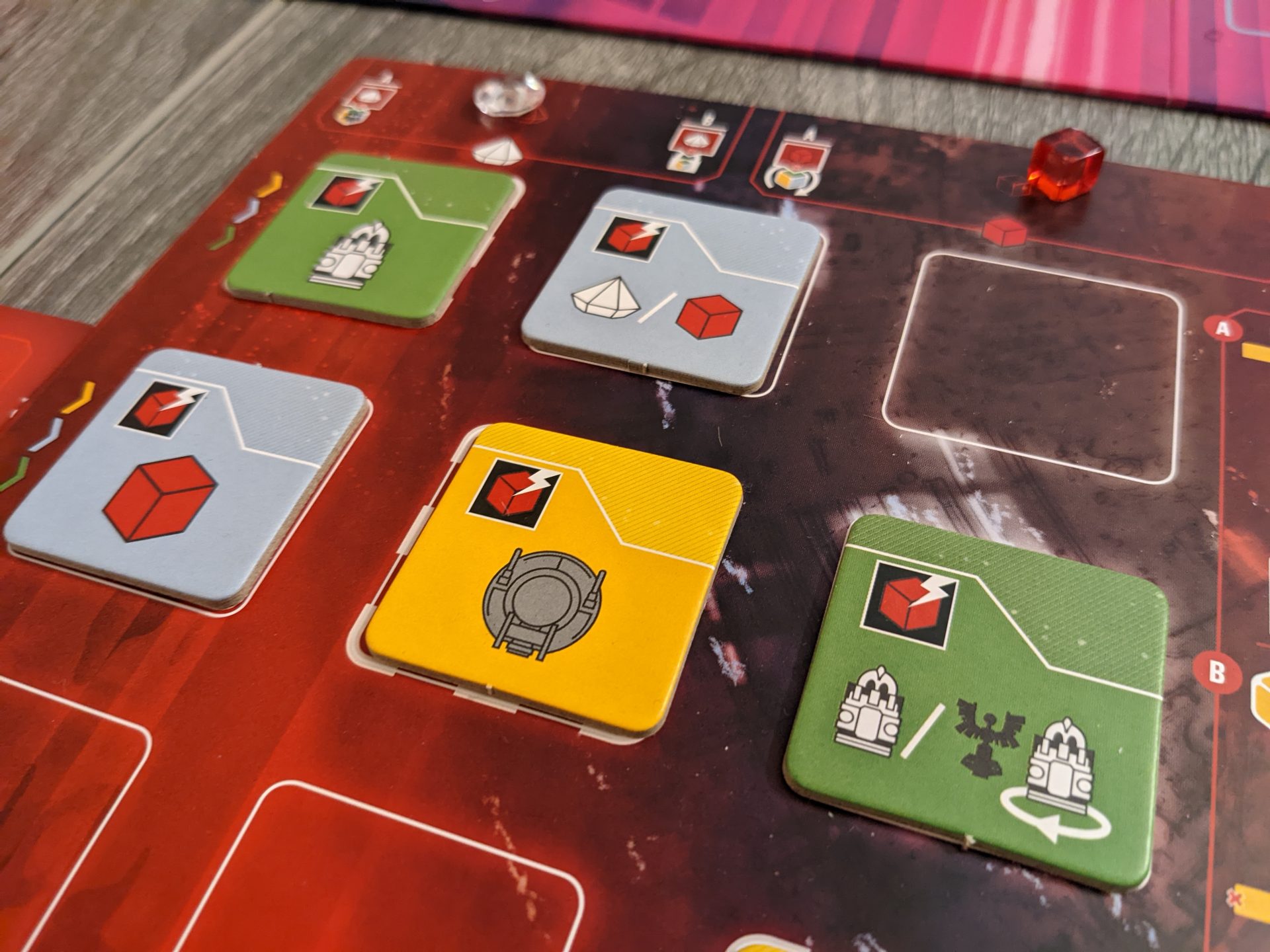
One other thing happens throughout player turns: the act of snatching dice from an opponent. You see, each time a player completes Sequence B, they roll a certain number of dice and place them in their “compartment.” Each player that does this can lock a max of one die away from other players, but the rest can be bought by any other player for a very low cost of one resource (which looks a lot like a gem, or maybe a diamond, but is still called a resource anyway).
In Black Angel, the compensation isn’t great for the player who just lost a die. One resource is generally not great in the game’s economy. And that’s the flat cost for buying any die; die values range from zero to 3 pips. The worst thing that can happen in this game is rolling your own dice, and rolling multiple 3s. In fact, during my third play of Black Angel, I rolled very well throughout the game, and each time I did, I cursed loudly.
Losing your dice blows, but it really blows when your fellow players don’t roll as well. And there is no pool of dummy dice available to draft from an automa either, so if you roll well and your fellow players don’t, you might find yourself stuck sometimes. You also can’t alter dice you draft from another player. In a game of high strategy, you will find yourself making tactical decisions often here.
Like Troyes, I think stealing other players’ dice is a blast in Black Angel. And another change to how the games differ: the round structure is static in Troyes. All players take turns, then rounds end when everyone has passed. In Black Angel, there are no set number of rounds, and players continuously pass throughout the game.
This means that you might run out of your own dice, then the player to your right passes and rolls new dice, and you can extend your time not passing by buying one of that player’s new dice. Opportunistic players might have a field day in this environment.
The game ends when the Black Angel reaches Spes (unless the Ravager deck runs dry first), and scoring is mostly done during gameplay. The rest comes from “advanced” tech tiles which can score you extra points if you meet their conditions, and more if they are squeezed off of your player board and into special slots which can boost the max number of points for that tile.
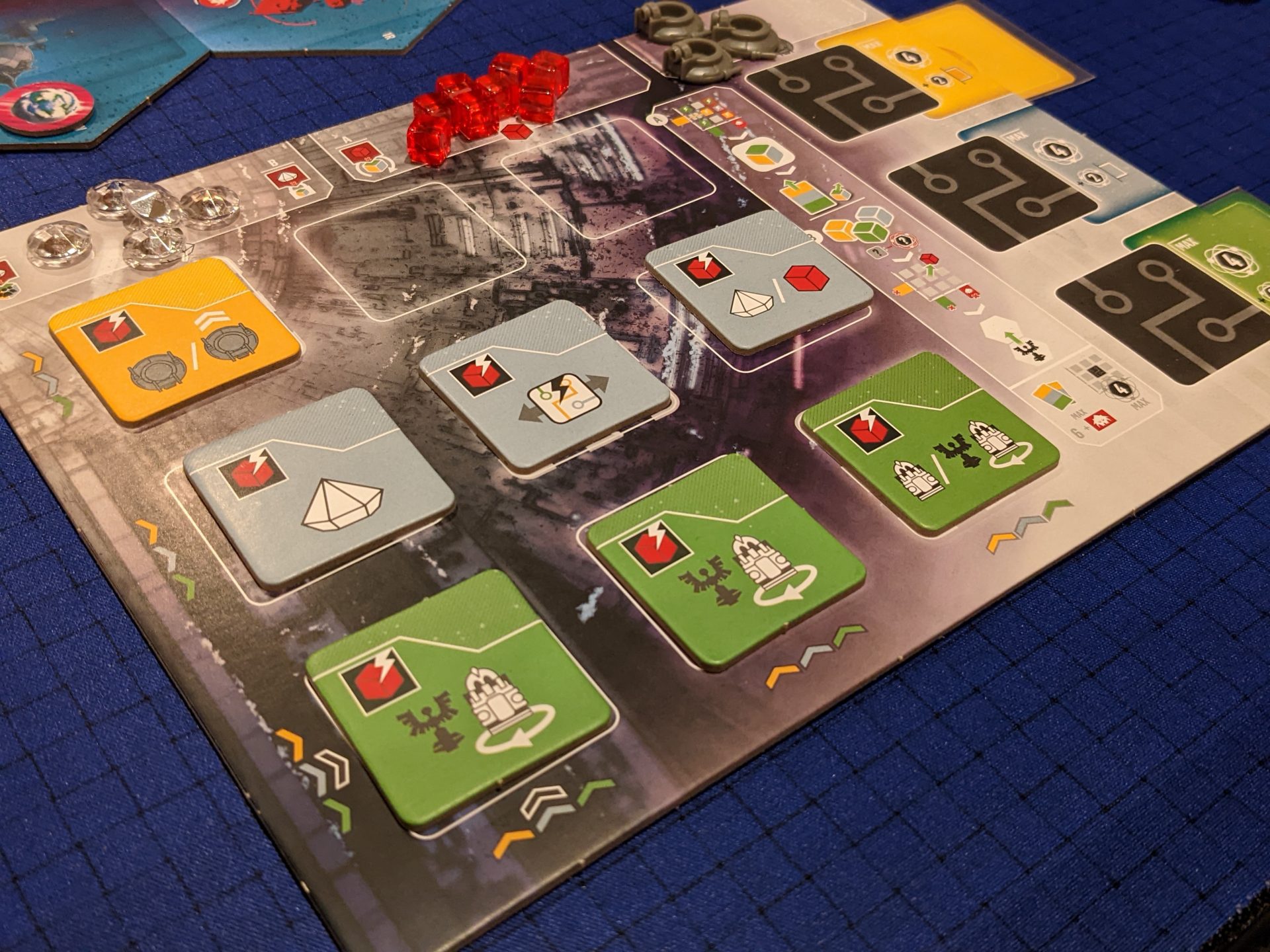
Big Turns?
Black Angel is a heavier experience than Troyes. On its own, Black Angel can be a very thinky engine building experience that rewards careful planning and taking advantage of anything your dice have to offer.
But is it a strategy game? Or one that rewards a read-and-react playstyle more?
On the one hand, it can prove valuable to place cards all over the space board, particularly ahead of the Black Angel. On the other hand, you could top deck some ridiculously good cards early in a game.
For example, if you can find a card that gives the owner 3 ships as a reward and that owner has a ship parked on it when it falls off the board, they will get another 3 ships as a reward, they will be set up with ships for the rest of the game.
Now, I like this mix. Some others would prefer a game that is not pure chaos, or at least a game that has limited chaos. A game of Black Angel with 4 players could mean that when you have passed, then re-rolled your 3 dice and all 3 dice show a value of 3 (the highest die value), you might have all 3 of your dice purchased if you didn’t lock one of those dice for yourself.
That level of “stabby” works for me, even if I’m the victim in this scenario. But it won’t work for everyone.
Beyond that, the mix of puzzles happening here really fit my brain. The 6 placement spots inside the ship help set up your turns on the space board when you are spending dice to earn bigger points. I’ve had a couple of big turns in every game of Black Angel, and setting those up can be very satisfying once you have a good feel for the cards.
Doing the optional action to trigger multiple tiles in my tech tree, then playing a die on the space board to get 3 activations of a conversation action (discarding cards and ships for lots of points, for example), can be great. Doing a 6 or 9-point action feels good in Black Angel, because scoring is so tight.
Or, watching a player roll a bunch of 3s when you were about to pass and do the same thing? Awesome. Thanks for that great roll, buddy; let me buy that green 3-die so that I can trigger another big action on my next turn.
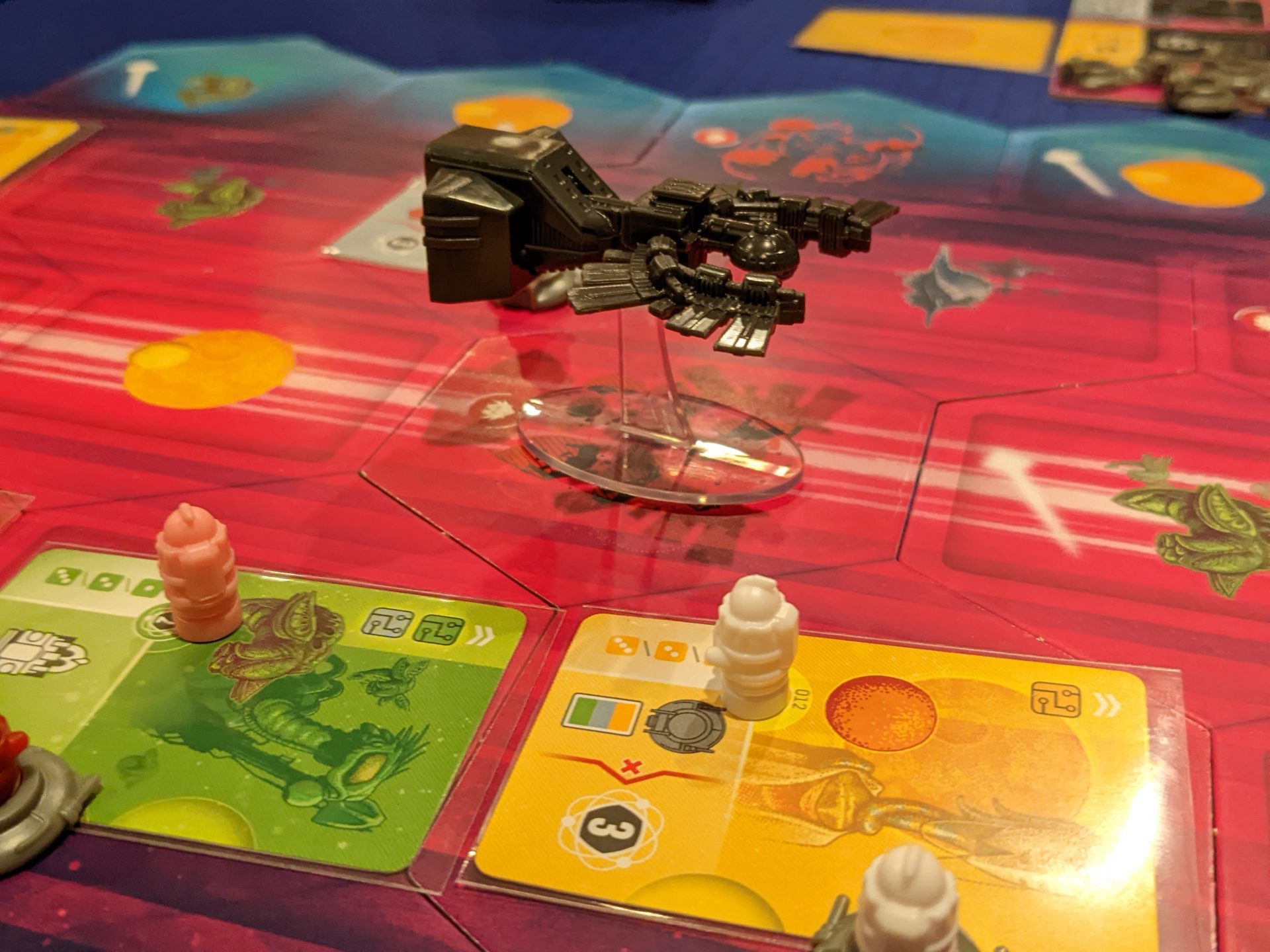
This or that?
“I’m not sure I would ever play Black Angel over Troyes if I had both in my collection.”
This quote, from a player who joined me for one of my review plays, stuck with me. I own both Black Angel and Troyes, and it’s important to distinguish the differences between the games.
I like both games. Troyes is better, shorter, and lighter, relatively speaking, than Black Angel. “Lighter” means I can get core gamers to play it, but I can also likely get my casual friends to try it. Troyes is certainly more accessible.
I like the artwork and production of Black Angel significantly more than the production of Troyes. Troyes is an older game, one that doesn’t really factor in things that I appreciate about many newer productions. Thick player boards. A slick color palette. The little robot tokens that sit comfortably in the base of the ship components, making for a fun-looking image of a robot flying a ship to a card on the edge of the space board.
As great as Troyes is, I have always thought that the board was a mess. If you’ve played both games, you can tell that a clean, refined look was important to O’Toole and the design team when Black Angel was in the drawing room. It has real table presence.
Black Angel is good. It’s not an all-timer, but I enjoy playing it and will keep it in my collection for now. Fans of Troyes absolutely should try Black Angel to feel out the differences for themselves. On its own, Black Angel is a solid experience for fans of sci-fi themes, heavy games and loads of dice. I actually think it’s the best place to start if you have not played either game, because then you get to see the game with fresh eyes, outside of the expectations that creep in from a Troyes veteran.


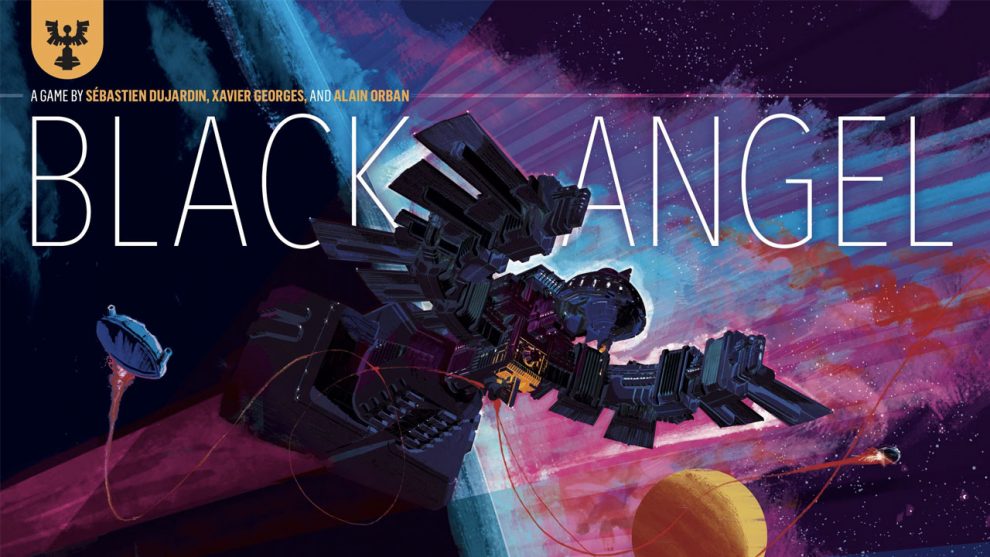

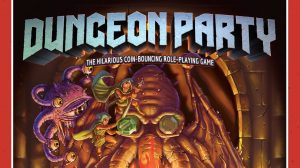

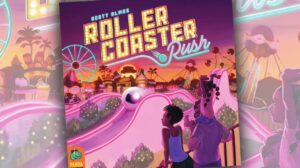





Add Comment